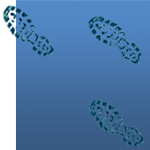|
Cleveland, Ohio has the distinction
of having had the most polluted river in the country. The Cuyahoga River was so
polluted in 1969 that it caught fire several times. Even we Republicans had to
wake up to the idea that we were ruining our neighborhoods, if not the whole
planet. Many say the Cuyahoga River converted the environmental movement from
fringe hippies to mainstream.
So it was that I paid a visit to
the Cuyahoga River, and I'm happy to report that smoking next to the river is
no longer hazardous, except of course to your lungs. Cleveland's parks and
waterfront gave further proof of a rebirth, an invitation to nature to return,
and to be greeted more kindly than before.
Looking back to the time of the
Cuyahoga's burning, I recall a transition from being a member species, as free
as black bears to roam about doing whatever we wanted, to a stewardship role
unlike that of any other creature. We had been kicked up to management,
responsible to develop and enforce a business plan for the business of running
the world in protected mode.
And we became outsiders as surely
as Lenin viewed management separate from the proletariat, culminating in
massive management projects such as turning down the temperature of the entire
planet.
Watching the majesty of a storm
rumbling in from Lake Erie, I was seized by a thought; what if we swing the
pendulum back to considering ourselves as just another member species, albeit
with some strange characteristics?
What if an oil tanker spill is as
natural as locusts devouring the countryside? What if our extermination of
species is as much a part of nature as the same done by asteroids and
volcanoes?
But if so, so is our emerging
environmental awareness, an evolution in our social consciousness as natural as
the evolution of our brains. We can call it our artistic evolution. For some
reason not yet clear to us, we all carry around inside us a feeling that an
undisturbed mountain glade is more pleasing than the aftermath of a strip mine.
And we have to act in accordance to these changing urges as surely as a
caterpillar eventually has to act like a butterfly.
The result is rather similar to
what we do as environmental managers, but the perception of ourselves is
different. We are not overlords screwing up our job, but fellow children of
nature learning our evolving role and acting accordingly.
We are brought back to the age old
observation of Chief Seattle that we are but strands in the web of life, but we
are that, and not just outsiders pulling strings. We can take delight in the
rebirth of the Cuyahoga and Cleveland, the return of the bison from the brink,
and many other instances where we have shown fidelity to our nature to love and
heal what we touch. We have more to do as our evolution continues, but as
residents of Noah's Ark, not its captain. |

